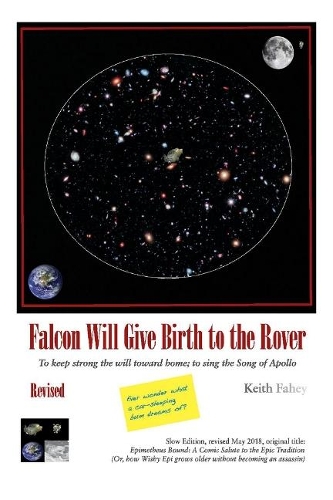
Falcon Will Give Birth to the Rover: To Keep Strong the Will Toward Home; to Sing the Song of Apollo
(Paperback)
Available Formats
Paperback
Published: 1st March 2023
Paperback
Published: 25th September 2018
Paperback
Published: 23rd August 2018
Publishing Details
Falcon Will Give Birth to the Rover: To Keep Strong the Will Toward Home; to Sing the Song of Apollo
By (Author) Keith Fahey
BookBaby
BookBaby
25th September 2018
United States
Classifications
General
Non Fiction
Physical Properties
Paperback
756
Width 152mm, Height 228mm, Spine 50mm
1170g
Description
Falcon Will Give Birth to the Roveris a work of imaginative nonfiction, an historical autobiography with concurrent headlines and events. It is written in the third person: "O wad some Power the giftie gie us / To see oursels as ithers see us."It is the story of Epimetheus, who lived in his car because he wished to be a singer. He was inspired by the Apollo Moon Flights: "If they can get to the Moon, why can't I [fill in the blank] ..."Apollo 8 revealed a paradisal planet, Apollo 10 released playful spirits ("Snoopy and Charley Brown are hugging each other!"), and Apollo11 gave us Tranquility Base.O the joy! Now for my own giant leap!Wherefore Apollo 12 served as augury: It made a "bull's-eye landing on the Ocean of Storms."Apollo 15 gave Wishy Epi his greatest inspiration. He had been living in his car, a 1968 Ford Falcon, for about two years when a reporter-prophet bestowed revelations: The prophet disclosed that Apollo 15's lunar lander was called Falcon, and the first extraterrestrial vehicle, Rover. He envisioned the planned landing, and oracled: "A little later, Falcon will give birth to the Rover."A sign! Yes, Epi is called to sing of Apollo!Epi forgot that Loxian Apollo is e'er ambiguous: that "Rover" has many types, and "a little later" could mean a month or two, a year or two, maybe even a score or two yet all are blinks of an eye "in the light of eternity."Failure wakened many Furies, all mirrored in ragers who could not control, or transform, their Furies. Wherefore Epi invoked the spirit of Ishmael, who took to the sea as his "substitute for pistol and ball." Yet the e'er-taunting Furies pursued, and only the epic tradition gave Epi the willingness to accept the descent into Hades; only the epic tradition affirmed his resolve to complete the return.
Author Bio
Keith Fahey is most unknown for his essay On Reading with an Equal Eye, in Leviathan, May 2011, a Melville journal
